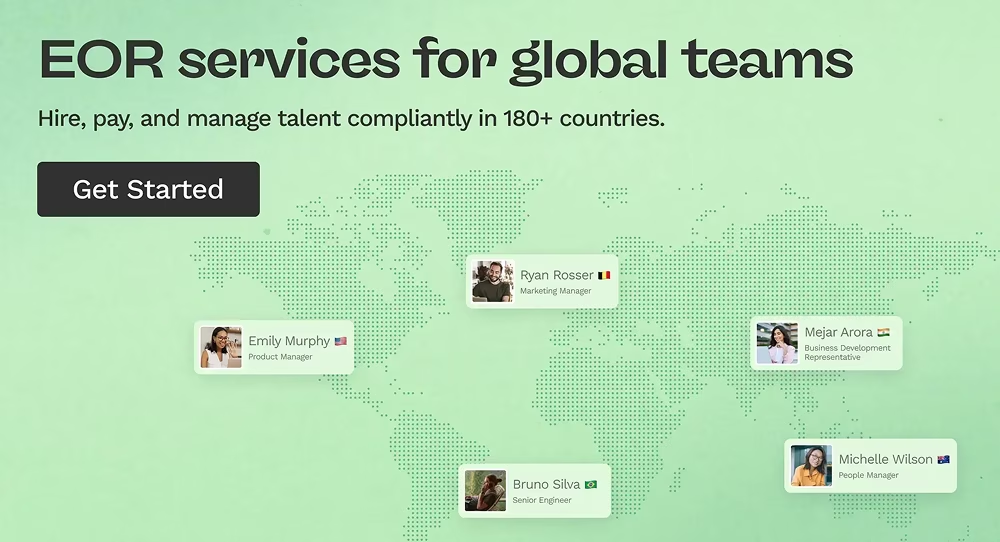Canada is an ideal hiring destination for global companies, and not just because of its time zone overlap with the United States. While that alignment certainly helps with collaboration, it's Canada's well-educated workforce, strong labor protections, and stable business environment that make it a standout choice for building distributed teams.
If you're looking to hire employees in Canada without establishing a legal entity, an employer of record (EOR) can help you do it quickly and compliantly. This guide will walk you through how EORs work in Canada—covering everything from employment contracts and benefits packages to payroll, severance pay, and employment insurance—so you can confidently grow your team.
A few things to know about hiring in Canada
Several local requirements matter when you engage an EOR to hire employees in Canada. Here's what every employer should be aware of.
Benefits and compensation
Canadian employment insurance (EI), Canada pension plan (CPP) contributions, paid time off, and statutory holidays are mandatory. While public healthcare covers basic medical needs, offering supplemental employee benefits like private health or dental insurance can help attract top talent.
Payroll
An EOR handles payroll in Canadian dollars, including federal and provincial tax withholdings, EI, pension contributions, and overtime pay where applicable. Compliance is essential to avoid penalties from the Canada Revenue Agency (CRA) or provincial agencies.
Leave requirements
Employees in Canada are entitled to a range of leaves, including vacation, parental leave, sick days, and paid holidays. The exact amount depends on the province and the employee's tenure with the company.
Employee termination
Terminating employment, including notice or severance pay, must follow federal and provincial standards. Notice periods vary, and severance payments are required depending on years of service and local regulations.
Taxes
Employers are responsible for deducting and remitting income tax, CPP, and EI. Provincial payroll taxes, like the Ontario Employer Health Tax, may also apply. An EOR guarantees timely tax filing and remittance.
Costs
The costs of hiring in Canada vary depending on the territory the employee is based in. Check out our territory-specific tools to get an idea of the associated tax costs:
- Alberta
- British Columbia
- Manitoba
- New Brunswick
- Newfoundland and Labrador
- Nova Scotia
- Prince Edward Island
- Quebec
- Saskatchewan
How to hire in Canada through an EOR
An EOR in Canada acts as the legal employer on your behalf. That means the EOR handles everything from employment contracts and payroll to employee benefits, EI, and compliance with Canadian labor laws, so you don't need to set up your own legal entity. You retain complete control over the day-to-day work of your team members, while the EOR ensures you operate compliantly under federal and provincial employment law.
Here's how the process works.
Choose a trusted EOR provider
Start by choosing an EOR that understands the ins and outs of hiring in Canada. That includes federal rules and province-specific requirements, from payroll to tax obligations. A good provider will simplify the hiring process and help you stay compliant and avoid misclassifications, so you can focus on finding the right talent for the role.
Define the role and employment terms
Next, define your hiring needs, including the job title, responsibilities, salary, location, working hours, and any specifics around benefits packages, including time off or bonuses.
The EOR will use this information to create a locally compliant employment contract, based on the province's requirements for paid time, minimum wage, overtime pay, and statutory employee benefits like healthcare or leave entitlements. You're still in control of the offer—you're just getting help delivering it the right way.
The EOR signs an employment contract with your hire
Finalize the details, and then the EOR will enter into a formal agreement with your selected candidate. This means the EOR becomes their legal employer in Canada, but only on paper; your organization manages the employee.
The EOR may handle onboarding, explain key terms of the employment contract, and ensure your new hire has everything they need, from payroll visibility to EI or a pension plan, if applicable.
The EOR manages onboarding, payroll, and compliance
After the contract is signed, the EOR handles the operational side of employment. They’ll set up payroll, calculate and remit taxes, and enroll the employee in benefits packages.
They'll also track overtime pay, monitor paid time off, and administer things like severance pay or government-mandated leave. If employee status changes, the EOR handles the required paperwork and makes sure all filings are accurate and timely.
Benefits of using an EOR in Canada
Using an EOR in Canada gives companies a faster, more straightforward way to build a local team. Instead of handling legal, tax, and HR processes alone, you delegate them to a trusted partner so you can focus on the hire, not the paperwork.
Here are some additional benefits:
- Simplified compliance with Canadian employment laws: Canada has complex, multi-layered labor laws that vary from province to province. An EOR handles the legal and regulatory requirements, from employment contracts and payroll tax withholdings to overtime pay rules and statutory benefits.
- Faster hiring without entity setup: Setting up a legal entity in Canada can be slow and costly, taking months and up to tens of thousands of dollars. An EOR removes that barrier, allowing you to hire employees in Canada immediately.
- Reduced administrative burden: Managing payroll, taxes, and mandatory contributions like EI or a pension plan takes time, and the more people you hire, the more complex it gets. An EOR handles those responsibilities in the background, so your team isn't pulled away from core projects.
What risks do businesses face from employee misclassification in Canada?
Canada has strong local labor laws, and companies hiring Canadian talent should keep a few things in mind:
- Penalties for non-compliance: The Canada Labour Program can require employers to retroactively pay wages, holiday pay, overtime, and other entitlements. It may also issue administrative monetary penalties, typically between $2,000 and $12,000 per violation, and publicly name repeat offenders. For federally regulated businesses, misclassification also risks non-compliance with EI or CPP remittance rules, which can trigger CRA back taxes, penalties, and interest.
- Legal disputes and retroactive entitlements: Misclassifying employees in Canada can lead to significant financial consequences. If a contractor is later determined to be an employee, your company could be responsible for back pay covering missed wages, overtime, severance pay, vacation, and other benefits, sometimes going back years.
In addition to the cost, there's reputational risk. Labor disputes tied to misclassification can become public and damage trust with external stakeholders.
- Misclassification can damage employee trust: Misclassification doesn't just lead to legal risk; it can also damage your brand in the eyes of your employees. In Canada, companies in violation may be named in public Labour Program notices or court filings, which can draw attention. Even without headlines, word can spread. Employees may start questioning whether their status is secure, which can hurt morale.
Grow your team in Canada with Oyster
Hiring in Canada doesn't mean navigating complex labor laws, setting up a legal entity, or figuring out payroll and employment contracts independently. With Oyster's EOR solution, you can bring on top Canadian talent without the red tape.
Oyster handles the essentials, such as drafting contracts that meet provincial standards, calculating required contributions for CPP and EI, and ensuring your business stays aligned with federal and local labor laws.
Oyster also supports self‑employed contractors, helping you decide which classification to hire under based on Canadian tax rules. If you're working with freelancers, check out our guide on self-employed taxes in Canada.
Ready to hire in Canada alongside a trusted partner? Explore Oyster's EOR platform and start building your team today.

About Oyster
Oyster is a global employment platform designed to enable visionary HR leaders to find, engage, pay, manage, develop, and take care of a thriving distributed workforce. Oyster lets growing companies give valued international team members the experience they deserve, without the usual headaches and expense.
Oyster enables hiring anywhere in the world—with reliable, compliant payroll, and great local benefits and perks.
.webp)




.avif)



.avif)
.avif)



_Leader_Leader%201%20(2)%20(3).svg)
_Leader_UnitedKingdom_Leader%201%20(1).svg)
_Leader_Europe_Leader%201%20(1).svg)
_Leader_Mid-Market_Leader%201%20(1).svg)
_Leader_Small-Business_Europe_Leader%202%20(2).svg)
_Leader_Small-Business_Leader%201%20(1).svg)
_FastestImplementation_Small-Business_GoLiveTime%201%20(1)%20(1).svg)